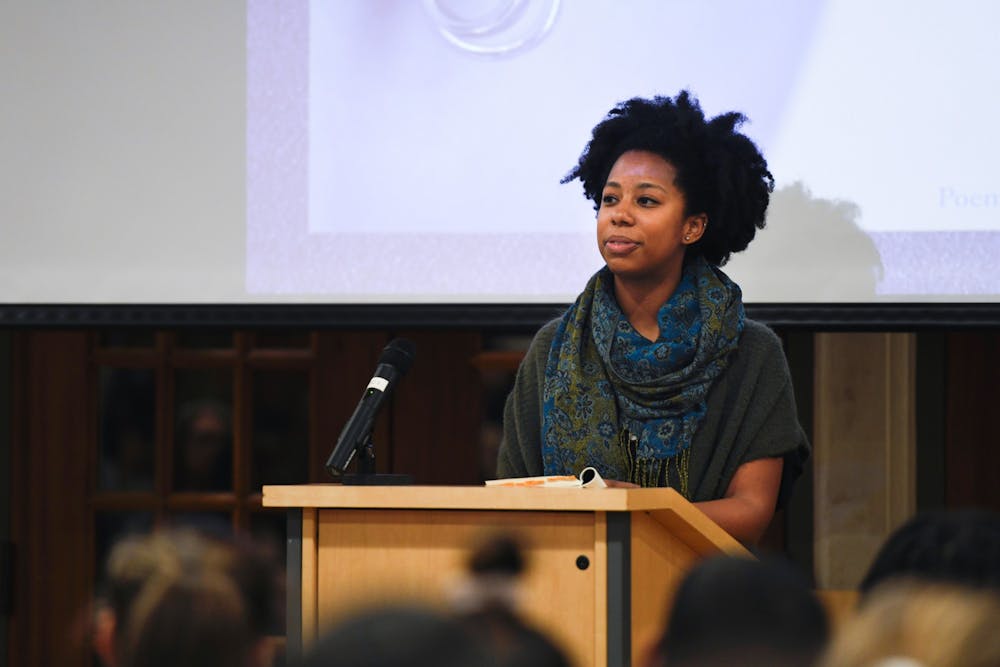Chet’la Sebree was stuck.
Sebree, who graduated from the University of Richmond in 2010, had almost finished writing the book “Mistress," a poetry collection largely focused on Sally Hemings — a woman enslaved by Thomas Jefferson who was the mother of several of his children — but she knew something was missing.
What she needed to add was still unclear when she embarked on a writer’s retreat in Washington state. The answer came to her, she said, when she burned herself on the flames of a fireplace at the site.
“I recognized that, 'Oh, pain is transformative and fire is transformative’ and realized that I needed something about the transformative power in the book,” Sebree said during a talk Tuesday night at the Carole Weinstein International Center. “[I]t became clear that the one poem that I hadn’t written was specifically about Sally Hemings as a good mother and it’s called 'Dusky Sally' and it’s talking about her attending fire.”
With the inclusion of this poem, Sebree’s book — published in October — is finally complete. She read several poems from it during her talk, the second installment of this year’s WILL*/WGSS speaker series and this year's third installment of the English department's Writers Series.
The book focuses on the lives and voices of Hemings and a modern-day female black speaker that Sebree named after herself.
It began as two separate projects, Sebree said in an interview before the talk. One of the projects was a manuscript about desire, the body and illness and the other was poems about Hemings.
“The more I wrote into the poems about desire and the body, the more I realized that there was a sort of conversation happening between the two speakers,” Sebree said. “There was a contemporary speaker that was speaking, and [I also] was writing these Sally Hemings poems.”
These poems about Hemings initially were from the perspectives of male historical figures, but Sebree said she had realized that instead of copying portrayals that already existed, she had wanted Hemings to have her own voice.
First-year Shaylen Lafferty, who attended the talk, said she had found Sebree’s discussion of embodying Hemings’ voice powerful.
“Even if sometimes we don’t use it, we have privilege being able to speak our minds today, and that’s something that a lot of people didn’t have, particularly Sally Hemings,” Lafferty said.
Although Sebree’s book is a creative work, it took large amounts of research and includes a timeline and extensive notes. In addition to conducting academic research, Sebree also had been a research fellow at Monticello, Jefferson’s home, and spent time there trying to engage in what Hemings’ life may have been like, Sebree said in her interview.
Enjoy what you're reading?
Signup for our newsletter
English and creative writing professor Brian Henry, who taught “Mistress” in his poetry writing class this semester and introduced Sebree at the talk, called the book a work of genius.
“The combination of the depth and breadth at the same time is really hard to achieve,” Henry said in an interview before the talk. “If you’re going to write a book with that kind of history in it, it’s incredibly hard to make it, you know, because it’s a poetry book — it’s not a thousand-page novel.”
During her talk, Sebree addressed the topic of discomfort.
“I think the first section of my book is actually entirely geared to make many readers — but particularly men and white women, or non-black women, I should say — uncomfortable because I want for, just that one section, for people who are not black women to know the discomfort of occupying a black woman’s body,” Sebree said.
This sense of discomfort, Sebree said in the interview, connected to a message she wanted to communicate through her book: The legacy of slavery continues to impact black women in a variety of ways.
“Really it’s just one woman’s story. It’s just my understanding of the world,” Sebree said. “I don’t want people to walk away from this and think, ‘Ah, yes, now I know what it is to be a black woman,’ because I think I also really want to resist any sort of monolithic representations of black womanhood. But I do want people to know that it’s a lot more complicated."
Sebree’s readers aren’t the only ones she sees as being able to gain insight from “Mistress.” She discovered as she was writing that she was trying to better understand her own life too.
“I realized that I was really trying to figure out what it meant for me, in my mid-20s to be a black woman living in the world, and really realized I was trying to figure out through writing about [Hemings] what it meant for her in hopes that I had a better understanding of what it meant for me,” Sebree said.
First-year Kamene Mang’oka said she had not had exposure to poetry before and attending Sebree’s talk had allowed her to explore it.
“I loved it,” Mang’oka said of the talk. “It was so raw, so unique, so honest. And I think it’s just empowering to see people of color actually writing these things. It was beautiful.”
Contact copy chief Savannah Wilson at savannah.wilson@richmond.edu.
Support independent student media
You can make a tax-deductible donation by clicking the button below, which takes you to our secure PayPal account. The page is set up to receive contributions in whatever amount you designate. We look forward to using the money we raise to further our mission of providing honest and accurate information to students, faculty, staff, alumni and others in the general public.
Donate Now


